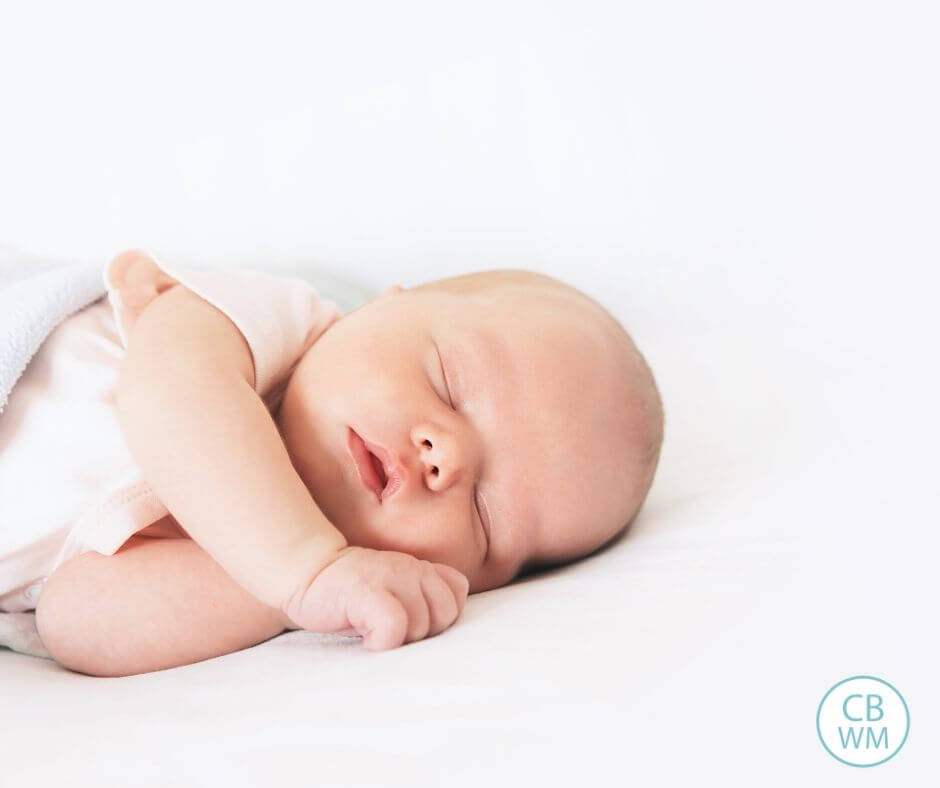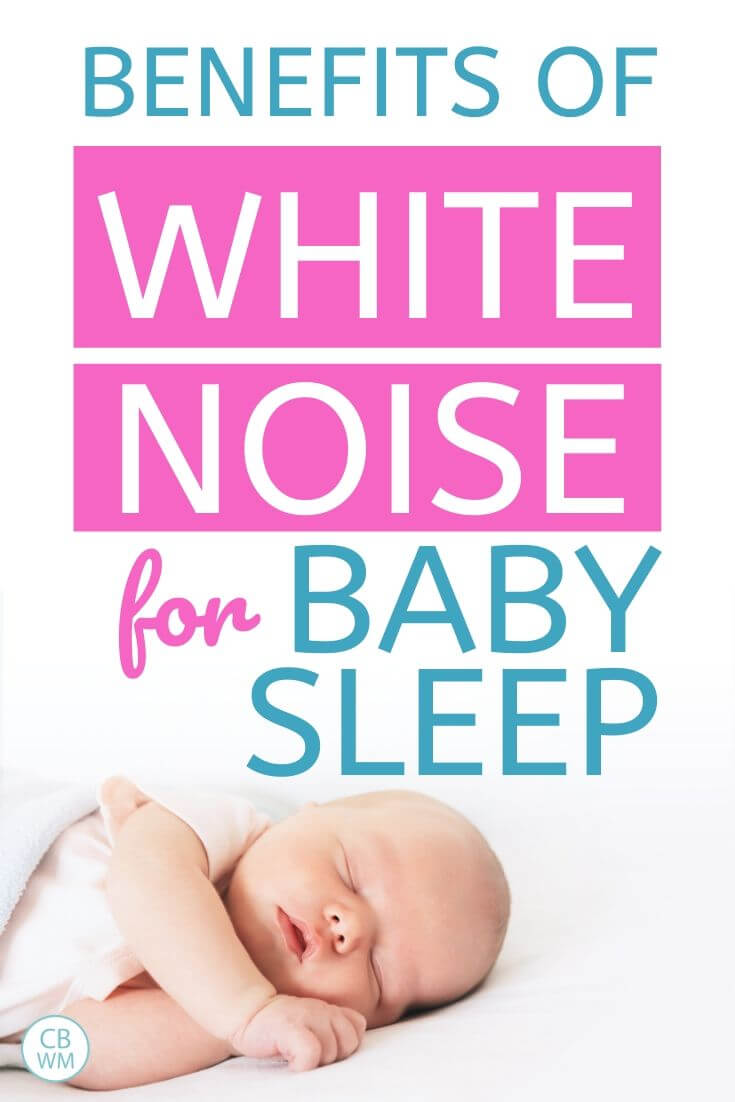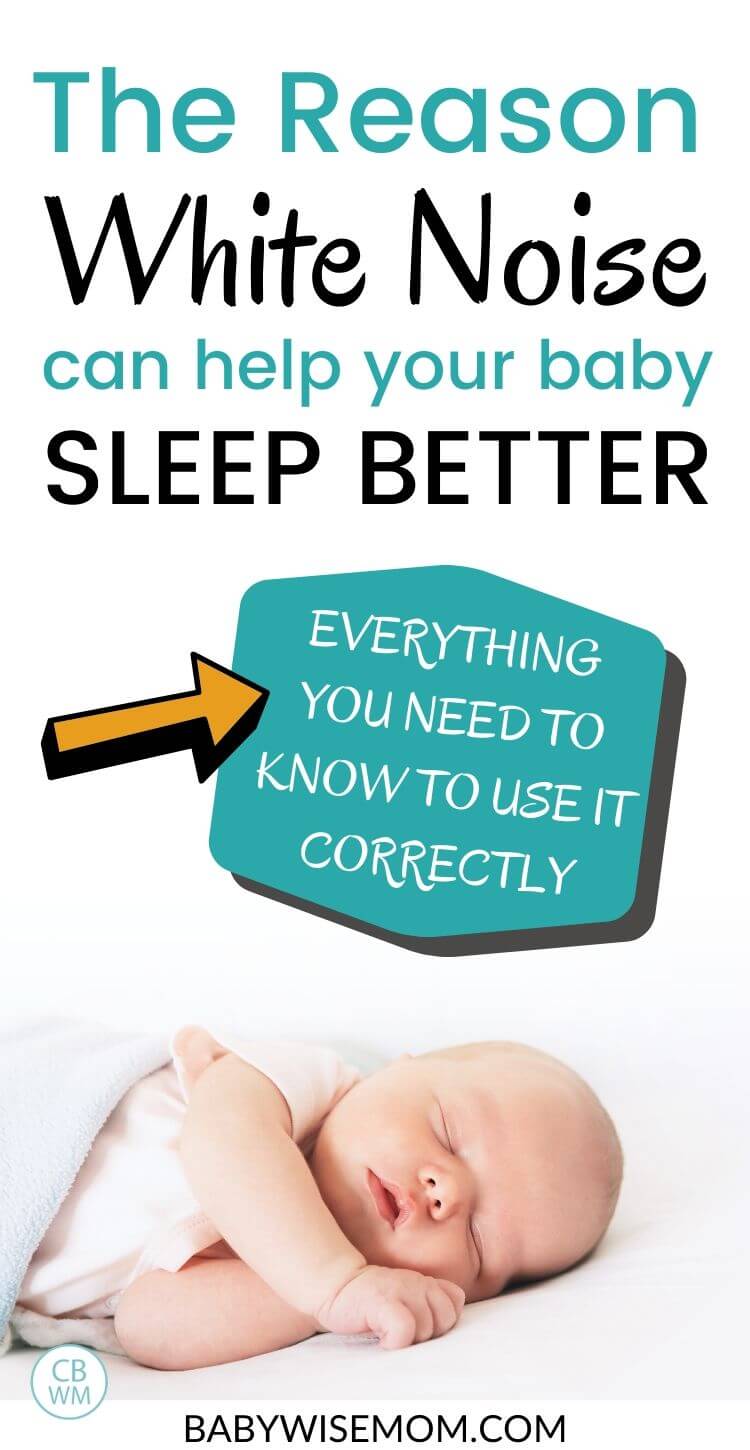White noise can be a powerful tool in helping your baby sleep well. Learn how to use it as a benefit without creating a sleep prop.

Many moms wonder if it is okay for them to use white noise to help their baby sleep better.
They, of course, are concerned about creating a sleep prop and don’t know if white noise qualifies as one, and if using noise will create sleep problems at some point down the road.
We first started using white noise at our house when Brayden, our oldest child, was 3.5 and Kaitlyn was 1.5.
It was purely accidental.
We have dry winters with forced air furnaces and their skin was getting dry, so we put humidifiers in each bedroom.
This was about a decade ago, so humidifiers were typically noisy machines. I realized these humidifiers created some white noise for them, and I liked it!
We started keeping a humidifier in each child’s bedroom all year round just to keep the white noise going.
At some point, we purchased white noise machines since a humidifier was not needed year-round in the house.
Post Contents
- What Is White Noise
- White Noise Can Help Baby Sleep
- Is White Noise Safe
- Will White Noise Become a Sleep Prop
- White Noise Can Help Fussy Babies
- What Are Potential Problems with White Noise
- Establish Solid Sleep
- Thank you!
- What Can Be Used for White Noise
- Best Sound Machines
- When To Stop Using White Noise
- Conclusion
- Related Baby Sleep Posts
What Is White Noise
White noise is a sound that can block out the other sounds going on. There can be natural white noise, like literal ocean waves. White noise can be nature, heartbeats, or static.
Many people compare white noise to what it was like for your baby to be in the womb. Newborns are new to the world, and white noise sounds can be familiar to what they experienced in the womb. This calms them and helps them sleep better.
White Noise Can Help Baby Sleep
White noise can help your infant fall asleep faster and stay asleep through sleep transitions.
White noise can help block out the sounds of the environment (like a busy city street, doorbells, or the neighbor’s barking dog). It can also block out the noises of the household, like siblings playing or adults doing chores.
I really, really, really, really wish I had thought to use white noise when Brayden was a baby.
We lived in a house that we were remodeling, and there were no finished bedrooms.
We all slept in the formal living room (yes, the whole family). We were basically living in a studio apartment. A humidifier next to his bed would have made it so I could move around more without waking him up.
At about 6 months old, we finally realized we could move him into the bathroom, which was big enough we could put a crib in it and still have plenty of room.
This made his night sleep much better, but white noise still would have been helpful since the bathroom was right off of the main living area.
When McKenna, my third child, was born, we went straight to the humidifier from the first day.
Having the humidifier in McKenna’s room was really great. The other two children were able to be kids all day without me stressing out over them being noisy during nap time.
I still taught them to be respectful of others while sleeping (something I wished some of my roommates in college would have learned!), and we had rules about inside and outside voices, but they could be normal kids in the house even while McKenna was asleep.
This wasn’t a problem when Kaitlyn was a baby because Brayden just isn’t a noisy person by nature. Plus, you get two kids together and you have a lot more noise than you do with just one child.
When Brinley, my fourth child, came along, we used a sound machine in her bedroom. The kids were again able to be normal children even while the baby was napping or down for the evening.
Is White Noise Safe
Many parents worry if white noise is safe or not.
As you choose your white noise machine, look for machines that sit at 50-70 decibels. That is a level that is safe to use all night long.
In the womb, baby sat at times over 90 decibels. 60-70 decibels should sound like a shower.
The American Academy of Pediatrics recommends white noise to be around 50 decibels.

Will White Noise Become a Sleep Prop
A sleep prop is something the child is dependent on for sleep. If something becomes a sleep prop, your little one will be incapable of sleeping without the sleep aid.
So how did McKenna sleep as a baby when there wasn’t white noise available?
She still slept just as well!
We had power outages often when McKenna was a baby. We also did little family trips camping. When we visited grandparents, we don’t bring white noise with us usually (at Christmas, we took her humidifier to my parents because we were going to be eating right above the room she sleeps in…with a wood floor beneath our feet).
When she didn’t have the white noise, she still slept just as well. She could fall asleep without it. She could stay asleep without it.
If you want to avoid reliance on white noise, you can get a white noise device that will turn off at some point in the night.
White Noise Can Help Fussy Babies
White noise is great for sleep, but it also helps fussy babies to calm down and stop crying. That white noise can really soothe even the fussiest babies and is often recommended for babies who have colic.
As a side note, if your baby has colic or is super fussy, you will also want to use swaddling to help your little one calm down.
If you are using white noise for a fussing baby, you will need to match the decibels to the baby’s decibel level.
>>>Read: Helpful Tips to Survive the Colicky Newborn
What Are Potential Problems with White Noise
In addition to the concern over white noise becoming a sleep prop, there is the potential of a device used for white noise to be too loud for baby. Some people worry about damaging ears and about delaying speech development.
To help with potential problems, keep the white noise machine at least 7 feet away from your baby’s crib. Keep the volume as low as you can and still get the benefits of the machine.
Another important step to take is to turn off white noise when it is not time to sleep. If your baby is playing in her room between naps, turn the white noise off while she plays.
If you worry about your baby not sleeping well without the machine, I always say I would rather my baby sleep better the 90% of time we are home than the 10% of time we are away.
But we have found our children sleep just fine without the white noise when it isn’t available. They might not sleep as well as they do at home, but most people do not sleep as well while away from home in general, so I don’t know how much of that is a lack of sound machine and how much is just a natural response to being away from home.
What Can Be Used for White Noise
You can use lots of different things for white noise.
- Humidifiers
- Sound Machines
- Tracks on Spotify or iTunes or other sites where you buy your mp3s. You can get free tracks here.
- Tracks on YouTube
- Box fans
- Vacuum cleaner
Best Sound Machines
If you do a simple search on sound machines, you will find that there isn’t one that everyone loves. There are many that many people love.
We have really liked Dohm sound machines and have the more expensive Dohm sound machine and the less expensive Dohm sound machine. They are simple machines and very little can break internally.
As I write this, the overall best rated sound machine on Amazon with the most reviews is this one. It is quite adjustable and has a timer function, which is nice if you want to limit the amount of time the sound machine is on.
You might like the option to run on battery. This sound machine has a rechargeable battery and rates quite well on Amazon. We had one that ran on batteries in the past and we liked it for power outages or for traveling without electricity.
For travel, you might like a portable sound machine like this one. This could be used in the car, at the park, or at grandma’s house.

When To Stop Using White Noise
There is no hard and fast rule for when to stop using white noise for sleep. Some people like to stop sometime between the first and second birthday.
As I write this, Brayden is 17. He has not used white noise for many years. He decided he wanted to be able to sleep anytime anywhere no matter if white noise was available or not.
My three girls, however, typically still have white noise at night. They all can sleep without it when needed (power outage, camping, vacation, etc.). McKenna has even been known to lie down on the busy airport floor and snooze away.
When you feel it is time to stop using white noise, you can start by turning the noise lower and lower and then eventually take it away altogether.
Conclusion
This is ultimately the way I see it. Sleep is important. Using white noise allows the noise of family members to be drown out.
This allows the family to move around normally and the child can sleep well.
When you visit family–let’s face it, some of them are loud!–you can bring along white noise. Then you can relax and enjoy yourself rather than stress out about the noise going on.
In many cases, when you travel, you can take your white noise with you. There are even travel sound machines available.
There can be drawbacks to white noise, but overall, the benefits far outweigh any potential cons of using white noise. White noise is a great aid in helping your little one sleep well.
Related Baby Sleep Posts
- How To Solve Your Baby’s Nighttime Sleep Issues
- The Complete Guide to Troubleshooting Short Baby Naps
- How to Help Your Baby Sleep Better With Swaddling

This post originally appeared on this blog in January 2010

